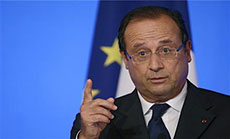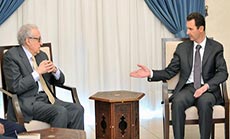
Syrian MP hints Damascus could strike Dimona reactor if attacked

Source: Haaretz, 22-12-2007
A Syrian member of parliament thought to be familiar with the thinking of President Bashar al-Assad is quoted in the London-based pan-Arab daily newspaper Al-Quds al-Arabi on Saturday as saying that Syria could strike "Israel's" nuclear reactor in Dimona as retaliation for any future violations of Syrian sovereignty.
In an interview with the paper, Mohammad Habash noted that Dimona is well within range of Syrian missiles, and that Damascus does not rule out the possibility of additional "Israeli" attacks against it.
As such, Habash added that Syria has no interest in escalating tensions between the two countries, and that diplomatic efforts are underway to renew contacts with 'Jerusalem' (al-Quds) over a possible peace deal. Habash said that no such contacts are currently being held.
An attempt to exchange messages between "Israel" and Syria in recent months has failed. European diplomatic sources said that the reason for the impasse was the inability to reach an agreed-upon agenda for talks between the two countries. But in off-the-record conversations, several sources close to Prime Minister Ehud Olmert say that "the Syrian track still has higher chances of success when compared to the Palestinian track."
In the past few months, "Israel" approached Assad via a number of friendly states, in an effort to evaluate the possibility of renewing direct contact. The main interlocutor in these exchanges has been Turkey, but "Israel" also made use of the good services of Germany, which still holds an open line of communications with Damascus.
Following a series of exchanges, the view in "Israel" is that the seriousness of Syrian intentions is still questionable.
European diplomats updated on some of the exchanges noted that "the bottom line was a negative one."
They pointed out that there was no agreement on an agenda for talks between the two sides, assuming such talks would actually take place.
"The Syrians wanted the talks to revolve only on the Golan [Heights]," the European diplomats said. "But 'Israel' wanted to first talk about other issues that trouble it, such as [Syria's] ties with Iran and the support for Hizbullah and Hamas, and Syria did not agree."
Olmert may be interested in furthering the Annapolis process, but increasingly, senior officials feel that the Syrian track must be given a chance to move forward.
"It is a lot simpler and it is possible to achieve an agreement in a short time," one of Olmert's confidants said. "The only problem is that the Syrians are not sending positive signals."
Another source close to Olmert was more optimistic. "The fact that they [Syria] came to Annapolis and canceled the conference of (so-called) 'terrorist' groups in Damascus were positive and encouraging signals."
A statement from the Prime Minister's Office said that Olmert "is carrying out an evaluation of the Syrian track and that is still ongoing."
The U.S., however, is strongly opposed to any goodwill gesture toward Damascus.
A Syrian member of parliament thought to be familiar with the thinking of President Bashar al-Assad is quoted in the London-based pan-Arab daily newspaper Al-Quds al-Arabi on Saturday as saying that Syria could strike "Israel's" nuclear reactor in Dimona as retaliation for any future violations of Syrian sovereignty.
In an interview with the paper, Mohammad Habash noted that Dimona is well within range of Syrian missiles, and that Damascus does not rule out the possibility of additional "Israeli" attacks against it.
As such, Habash added that Syria has no interest in escalating tensions between the two countries, and that diplomatic efforts are underway to renew contacts with 'Jerusalem' (al-Quds) over a possible peace deal. Habash said that no such contacts are currently being held.
An attempt to exchange messages between "Israel" and Syria in recent months has failed. European diplomatic sources said that the reason for the impasse was the inability to reach an agreed-upon agenda for talks between the two countries. But in off-the-record conversations, several sources close to Prime Minister Ehud Olmert say that "the Syrian track still has higher chances of success when compared to the Palestinian track."
In the past few months, "Israel" approached Assad via a number of friendly states, in an effort to evaluate the possibility of renewing direct contact. The main interlocutor in these exchanges has been Turkey, but "Israel" also made use of the good services of Germany, which still holds an open line of communications with Damascus.
Following a series of exchanges, the view in "Israel" is that the seriousness of Syrian intentions is still questionable.
European diplomats updated on some of the exchanges noted that "the bottom line was a negative one."
They pointed out that there was no agreement on an agenda for talks between the two sides, assuming such talks would actually take place.
"The Syrians wanted the talks to revolve only on the Golan [Heights]," the European diplomats said. "But 'Israel' wanted to first talk about other issues that trouble it, such as [Syria's] ties with Iran and the support for Hizbullah and Hamas, and Syria did not agree."
Olmert may be interested in furthering the Annapolis process, but increasingly, senior officials feel that the Syrian track must be given a chance to move forward.
"It is a lot simpler and it is possible to achieve an agreement in a short time," one of Olmert's confidants said. "The only problem is that the Syrians are not sending positive signals."
Another source close to Olmert was more optimistic. "The fact that they [Syria] came to Annapolis and canceled the conference of (so-called) 'terrorist' groups in Damascus were positive and encouraging signals."
A statement from the Prime Minister's Office said that Olmert "is carrying out an evaluation of the Syrian track and that is still ongoing."
The U.S., however, is strongly opposed to any goodwill gesture toward Damascus.
- Related News

France’s Hollande in Qatar for Warplane Deal
8 years ago
Iraq Police Dismantles Al-Qaeda Protest Site
10 years ago
